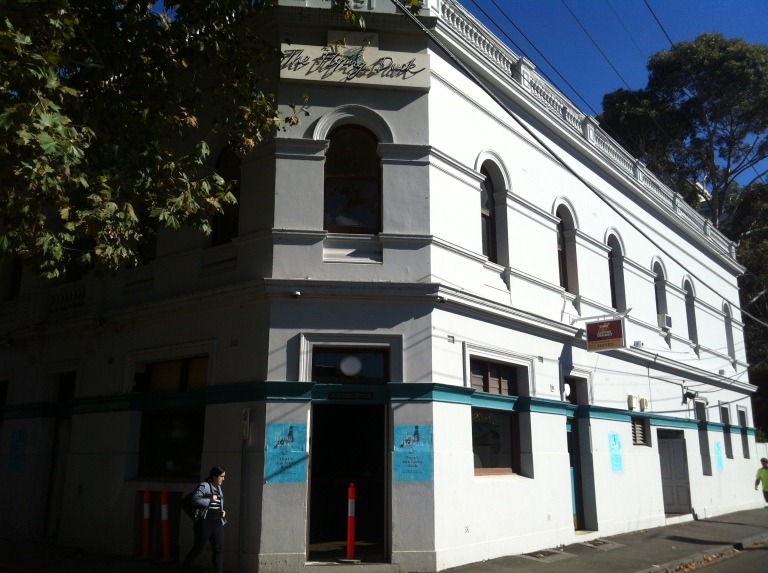
The screech of a power saw pierces the silence hanging on Prahran’s still, inner-suburban, Bendigo Street. An angle grinder soon joins in the ever-welcoming call, as men in paint-speckled overalls wade their way between a parked van and the inner confines of a double story, corner building.
Its rendered walls currently a pale, bluey-grey colour almost resemblant of downy plumage, this 19th century hotel is one which has struggled to remain the same.
A balustrade-lined roof reveals its Victorian Italianate architectural genetics, while an arched pediment crowns the front facing corner; raised lettering reading, “Erected 1891.”
While such may suggest that life on this quiet corner might have remained somewhat constant, lower down its dated neon signage subtly mounts a protesting scream, as it scrawls, ‘The Flying Duck”.
Inside, the hotel is momentarily disembowelled – pipes and wires hang from walls and ceilings, carpentry materials cover parts of the floor yet to be torn up and those paint speckled overalls reappear atop a ladder with a paint roller in their wearer’s hand.
But refreshment of the establishment’s ‘cosmetics’ is as much change as The Flying Duck’s newest keepers are looking to sweep through.
“The venue as a pub will stay exactly the same,” Operations Manager Chad De Lany says, endearingly and efficiently referring to the hotel as just ‘the Duck’.
Only last year, The Flying Duck escaped the wrecking ball, as the then title holder was set to partially demolish the hotel to make way for a six-storey, 40 apartment complex.
For its survival, the Duck has more than 300 of its neighbouring residents to thank after they successfully fought to have the Planning Permit scrapped.
And for its regeneration: the Zig Inge Group, who paid a sky-high price of almost $4.4 million fighting off overseas and local suitors to take the reigns.
“Everyone’s rapt,” De Lany announces, his voice bouncing as his eyes expand with enthusiasm.
“Numerous people are walking past every day and they’re sticking their head in and everyone’s so happy that it’s still going to be a pub.”
Fitting seamlessly in its immediate environment, it isn’t hard to think why it is that so many fought to have the Duck remain in all its soon-to-be-current glory.
For what ostensibly is one large pile of brick and mortar, the Duck somehow manages to sit softly nestled on its corner, perfectly comfortable, surrounded by Bendigo street’s collection of Victorian and Edwardian homes – some ramshackle and rusting, others meticulously manicured.
This community has not only saved the Duck, but will also be paramount in ensuring that it thrives in its latest incarnation. Or so its operators are hoping.
“Tucked away a little bit, people will feel as though, hopefully, they have a sense of ownership of it, and they’ll use it a lot, “ De Lany explains.
With a large focus on food after redeveloping The Flinders Hotel on the Mornington Peninsula in Victoria’s south, the Zig Inge Group will be hoping to take advantage of the increasingly time-poor lifestyles of those in the inner-suburbs.
“People eat out a lot more now… 20 years ago, it was more that special occasion when people were going out.” De Lany recalls.
“People are time poor; I think that’s the main reason. And living around this area, a lot of people are living in shoeboxes and they haven’t got the space.
“Here, this will, I believe, serve more as a convenience as well.“
With a packed corridor of bars, pubs and restaurants spanning almost the entire length of Prahran’s allotment of Chapel St, some would question the move to sink such a large amount of capital into a pub invisible to the crowds that consistently straddle one of Melbourne’s most popular streets.
It’s here that the Duck’s Operations Manager succinctly taps in to the greater role played by the ‘pub’, while swiping away any notion of a battle for relevance.
“This would be your meeting place.”
Built in 1891 on the grave of The Emu Hotel, the Duck was born in a time when Prahran boasted more than 50 hotels, all serving the immediate community as the epicentre of social life; the meeting place.
Despite a existence where transformation has threatened to be the only constant, the Duck has flown long enough to appreciate that no matter how great the threat of change, some things just stay the same.